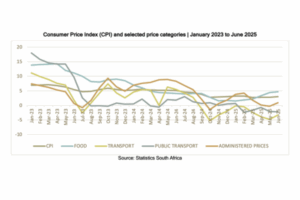What will it take for the national budget to truly reflect the lived realities of women in South Africa? What will it take for care work to be justly recognised and remunerated as real work? Lastly, what will it take for economic policy to stop reinforcing inequality and start dismantling it?
This Women’s Month, we remember that our struggles for dignity, safety, and equality are ongoing and deeply connected to the conditions of work, care, and economies that shape our lives. There are many powerful examples of why vulnerable workers and women must be at the centre of just transition planning. Matshidiso Lencoasa, the Chairperson of the Budget Justice Coalition and a Budget Analyst at SECTION27, shares a grounded, feminist perspective on the fight for economic justice in South Africa.

Matshidiso Lencoasa, the Chairperson of the Budget Justice Coalition and a Budget Analyst at SECTION27
Matshidiso grew up in the coal mining town of Emalahleni (Witbank), in the 90s. Historically, Emalahleni’s economy was built on extractive industries that brought profit to corporations while leaving deep scars on the community. Today, the town is shaped by pollution, poverty, inequality, informalisation, precarious work, and failing infrastructure.
"(In my hometown) I saw the impact of the mines on my community on water, health, and especially on women. Women were also mining coal, just informally and unpaid. I always wanted to do something to change that.”
From an early age, Matshidiso wanted to be part of effecting positive change in her community. She dreamed of becoming the CFO of a mining company, a position which she hoped would allow her to use financial power to drive human rights decisions and improve the lives of her family and community. On her journey toward becoming an economist, she witnessed the effects of inequitable access to higher learning for young people in South Africa, and as a result became a part of the Fees Must Fall at Wits University. It was at this point that her journey took a new direction.
“The Fees Must Fall movement opened my eyes to how structural violence was everywhere, not just in my hometown. That’s when I realised I wanted to work at the root of the problem: how we make decisions about money and power.”
Today, Matshidiso’s work is at the intersection of economic policy and gender equality. She believes our national budget is one of the most powerful tools in advancing justice. In the same breath, she reminds us that the national budget also undermines the realisation of economic justice.
"If we’re serious about ending poverty, violence, and inequality, we can’t ignore how we allocate money,” she says. “It is women, especially Black women, who are most affected by poverty, unemployment, and unpaid care work. The budget must reflect that reality.”
Matshidiso advocates for gender-responsive budgeting, where every public Rand is spent within an equity-grounded framework, from child grants and healthcare, to funding for shelters, social workers, and HIV/AIDS treatment. “These aren’t just expenses, they are investments in dignity,” she says.
South Africa is marred by the persistent neglect of care work and care economies which reinforces gender inequality and denies millions of women the dignity, support, and economic security they deserve. One such area of work is that of Volunteer Food Handlers in the Department of Education’s National School Nutrition Programme, a programme that successfully ensures learners’ access to nutritious meals every school day. Having engaged with workers across the continuum of work, Matshidiso shares a deep concern with the unrecognised and unpaid care work done mostly by women that sustains households, communities, and the broader economy, yet remains invisible in policy design and undervalued in budgeting processes.
“When women feed children, care for the sick, and run households, it’s work. Yet it’s not protected or paid. That’s why food handlers in schools being called ‘volunteers’ bothers me so much. They are doing essential work.”
She calls for a shift in how we design industrial and economic policy:
“When we think of ‘work’, we picture men in hard hats. But women are holding up this economy in invisible ways. Our policies must reflect that.”
Despite the challenges, Matshidiso remains hopeful. She points to policies like the Child Support Grant and National School Nutrition Programme (NSNP) frameworks as successes that should be expanded and strengthened, and advocates against the ongoing budget cuts in these areas. “These interventions have lifted millions out of poverty. But they need better funding, and the women behind them, like the Food Handlers, deserve formal recognition and decent working conditions.”
For Matshidiso, trade unions are essential to driving gender equality in economic policy. She encourages unions to:
- Push for gender-responsive budgeting and accountability in Parliament.
- Recognise and include informal and care workers in collective bargaining.
- Partner with civil society to monitor how public funds are allocated and spent.
- Support leadership pipelines for young Black women in economic spaces.
“Feminist economic justice isn’t a women’s issue, it’s a workers’ issue, a community issue, a national issue. We have inherited a broken (socio-political and socio-economic) system, but we also have the power to fix it. Our generation must break the cycle, for ourselves, and for the generations that come after us.”
With solidarity, the Labour Research Service wishes a happy Women’s Month to all the women workers and allies fighting for justice in formal and informal workspaces, in our homes, in our communities, and in decision-making spaces. Let us continue to organise, strategise, and realise our dream of a country where dignity is not an afterthought when it comes to inclusive fiscal planning.
RELATED ARTICLES
Care work and public budgets: A feminist inquiry
What does the national budget say about how the government values care work?
Unlocking the true value of women’s work in school nutrition







